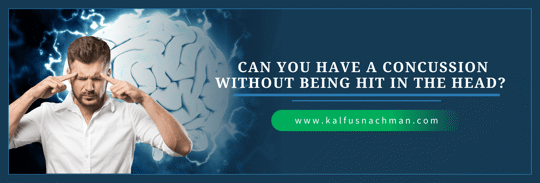Yes, getting a concussion without being hit in the head is possible. A concussion is a traumatic brain injury (TBI) that occurs when the brain is shaken or jolted inside the skull. This can happen when there is a sudden acceleration or deceleration of the head, even if the head doesn't directly hit an object.
Most concussion victims recover in a few days or weeks, but for some, it can lead to a chronic condition that causes or accelerates various physical, cognitive, and behavioral disorders.
If your concussion resulted from someone else's negligence or intentional act, you might have a legal claim for damages. However, the legal process can be complex, with strict deadlines for filing a claim. Consulting an attorney immediately after suffering a concussion can be crucial. An experienced traumatic brain injury attorney can help ensure that your legal rights are protected and that you have the best chance of receiving fair compensation for your injuries.
Kalfus & Nachman's top-rated traumatic brain injury attorneys in Virginia can help protect your legal rights, document your injuries, deal with insurance companies, and provide guidance and support throughout the process.
Common Causes Of Concussions That May Not Entail A Direct Hit To The Head
As mentioned earlier, concussions can occur without hitting the head directly. Here are some common causes of concussions without being hit in the head:
- Whiplash: This is a common cause of concussion in car accidents, sports injuries, and other types of trauma where the head is suddenly jerked forward and then back, causing the brain to hit the inside of the skull.
- Falls: Falls are a leading cause of concussions, especially in older adults. Even falling from a standing position can cause the brain to wiggle inside the skull, leading to a concussion.
- Shaken baby syndrome: Infants and young children are particularly vulnerable to concussions from being shaken. The violent shaking can cause the brain to hit the inside of the skull, leading to a concussion or other brain injuries.
- Blast injuries: Explosions or blasts from events like combat, industrial accidents, or fireworks can cause concussions. The shockwave from the explosion can travel through the body and cause the brain to move inside the skull.
- Sports injuries: Sports like football, soccer, hockey, and basketball can put athletes at risk of concussions, even without hitting their heads directly. For example, a brutal hit to the body can cause the head to snap back and forth, leading to a concussion.
It is vital to seek medical attention if you suspect you or someone else has a concussion, regardless of the cause. A healthcare professional can help diagnose the injury and recommend the appropriate treatment.
Signs And Symptoms Of Concussion Injury
The signs and symptoms of a concussion injury can vary from victim to victim and may not be immediately apparent. Here are some common signs and symptoms to watch out for:
- Headache or pressure in the head
- Nausea or vomiting
- Dizziness or lightheadedness
- Blurred vision or sensitivity to light
- Ringing in the ears or hearing loss
- Fatigue or feeling sluggish
- Confusion or feeling dazed
- Memory problems or difficulty concentrating
- Mood changes, such as irritability or depression
- Changes in sleep patterns, such as sleeping more or less than usual
Sometimes, symptoms may not appear until several hours or even days after the injury. Not all concussions involve loss of consciousness; a person can have a concussion even without visible signs of damage. If you or someone you know has experienced a blow to the head or body and exhibits any of the above symptoms, it is vital to seek medical attention immediately. A healthcare professional can evaluate and determine the best course of treatment.
How to claim compensation for a concussion injury in Virginia?
Concussion injuries may require medical attention, including emergency room visits, diagnostic testing, and ongoing treatment such as physical therapy, occupational therapy, or counseling. Victims may experience lost wages or earning capacity due to recovery time or permanent disability. However, if you have sustained a concussion injury due to someone else's negligence or intentional act, you may be eligible to claim compensation for your damages. Here are some steps you can take immediately:
- Seek medical attention: It's essential to get medical attention as soon as possible after a concussion injury, both for your health and to establish a record of your injury.
- Document your injury: Record all medical treatment, including doctor's appointments, tests, and medications. It can help establish the severity and duration of your injury.
- Gather evidence: If possible, gather evidence related to the incident that caused your concussion injury, including witness statements, photographs, and other relevant documentation.
- Consult with a personal injury lawyer: An expert traumatic brain injury lawyer can help you understand your legal options and assist you through the compensation claim process.
- File a claim: Your lawyer can help you file a claim with the appropriate insurance company or pursue a lawsuit against the responsible party.
Claiming compensation for a concussion injury without being hit in the head can be challenging. A seasoned brain injury lawyer can play a crucial role in a concussion claim by providing legal guidance and advocacy throughout the claims process.
Top-rated Virginia Concussion Injury lawyers to Help
Suffering a concussion can be a traumatic experience, and victims need continuous emotional support and guidance to recoup. Virginia's award-winning traumata brain injury attorneys at Kalfus & Nachman can help you understand the full extent of your damages, including medical expenses, lost earnings, pain and suffering, and other losses as a result of your concussion. We will provide comprehensive legal representation and support to ensure you get the compensation you deserve for your concussion injury. Call us for a free consultation today: 855-880-8163.
